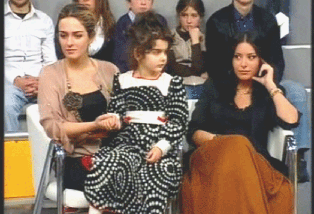Human Rights Center
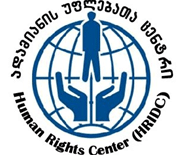
Announcements of Moambe, Politicians’ Wifes and Balance on Public Broadcaster
Aleko Tskitishvili
Soon, The Human Rights Center will finish media-monitoring of parliamentary elections, which covered not only pre-election but post-election period too, in accordance to the project agreement.
The Human Rights Center monitors to observe hidden political, social and political advertisements aired by the following TV-Companies: Public Broadcaster, Imedi, Rustavi 2, Kavkasia, Maestro and TV 9.
Although the election process continued after parliamentary elections via discussing various suits at CEC and courts, neither qualified election subjects, nor other political parties participating in the elections, nor CEC, NGOs and international organizations placed advertisements in TV-Companies.
Since October 1, Parliamentary Election Day, HRC monitors observed only a few advertisement clips connected with election issues. Among them was the so-called interval aired by GPB, which was prepared by GPB itself.
This advertisement of the GPB discussed the election period coverage. We saw journalists from the news program Moambe, which features political talk shows: Aktsentebi, Dialogi, Debatebi and Media-Monitor. Juxtaposed to this, we saw the head of the OSCE Observation Mission, Jannis Lenarchich, representative of OSCE/ODIHR Election Observation Mission, Nikolai Vulchanov, head of OSCE/ODIHR Election Observation Mission (2010) Audrey Glover, head of PACE Observation Mission Milan Kabrnov, head of OSCE Parliamentary Assembly Observation Mission, Tonino Picula, positively evaluated activities of GPB when covering the ongoing election process. After the advertisement we saw a text: “Public Broadcaster – Unbiased, Balanced, Impartial.” The advertisement lasts 55 seconds and is usually aired between 19:00 and 20:00 before news program Moambe starts.
Since the beginning of the HRC media monitoring, there had been remarks to GPB about the coverage of the parliamentary elections. We wrote in the first periodic reports of media monitoring that the advertisements, prepared by the orders of the governmental institutions and social advertisements about their activities contained signs of hidden political advertisement. Because of this trend, Inter-Agency Task Force Commission recommended that the GPB and government stop placements of the advertisements, which could be perceived as their election advertisement. Since August 1, when the pre-election period officially started, GPB stopped similar advertisements and a number of advertisements qualified to election subjects to affect. The Human Rights Center indicated this tendency in its late periodic reports.
Besides the advertisement intervals, the HRC monitors observed various programs, talk shows and announcements in order to detect possible facts of hidden advertisement. The lack of definition for hidden political advertisements in the acting edition of the Georgian Election Code complicated the monitoring process. The Law of Georgian on Advertising, Law on Broadcasting and regulations in the Election Code are not enough to eradicate hidden political advertisements. So, in the process of media monitoring, we relied on 1999 recommendations for CoE member countries adopted by CoE Committee of Ministers on Measures Concerning Media Coverage of Election Campaigns. Although these recommendations do not directly mention hidden advertisement, its context indicates the prohibition of similar advertisements. In accordance to recommendations, public and private broadcasters, during the election period, should be fair, balanced and impartial in their news and current affairs programmes, including discussion programmes such as interviews or debates. Candidates already occupying official positions may attempt to gain undue advantage through additional news coverage of their official functions. The recommendation therefore stresses that no privileged treatment should be given to public authorities during such programmes. A separate topic is dedicated to the issue of coverage for entertainment programmes. Via the recommendations of the Committee of Ministers of CoE, special care should be taken with entertainment programmes that may have an influence on voters, so that certain parties or contenders do not obtain an unfair advantage. Recommendations prohibit giving advantage to concrete political subjects in parody programs as well.
In accordance to the media monitoring project, in the frame of a qualitative survey, our purpose was to evaluate whether PR and information was differentiated from each other in different programs, whether there was hidden advertisement and PR provided in the form of reporting. The project did not envisage monitoring of news programmes or main news programmes of the day. However, due to high public interest, we additionally studied announcements of main news program of GPB Moambe from August 1 to October 1. As a rule, those announcements were aired in the advertisement intervals at 19:30 pm. As a result we observed the following in the announcements of Moambe:
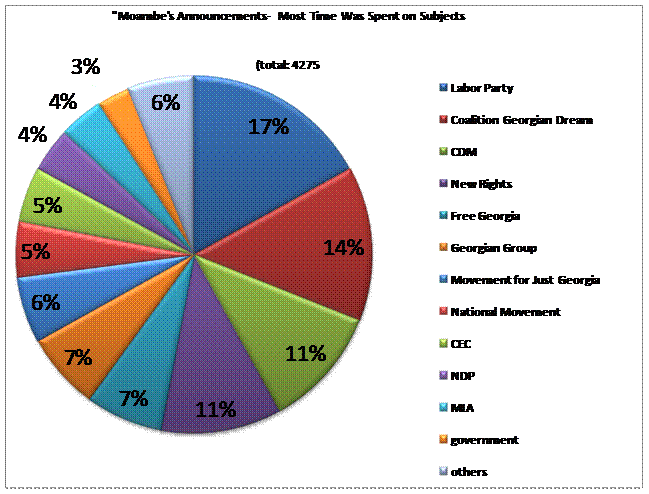
As the diagram shows, less than twice the time was spent on the ruling party National Movement than on Labor Party or Coalition Georgian Dream in the announcements of the Moambe. However, activities of the ruling party were often associated with the activities of the government and ministries. So, time spent on the subjects – government and MIA might be added to the time spent on National Movement that finally makes 12%.
Of course, the tone of coverage from aforementioned subjects in the Moambe’s announcements should be considered. Next the diagram shows that the subject “government” was covered in 100% negative tone that was connected with the comment of the Secretary of National Security Council of Georgia,Giga Bokeria, on the day when video footage about the torture and ill-treatment of the prisoners was depicted by TV channels; he criticized the government for “systemic problems” in the prisons. MIA’s coverage was also a partly negative tone (13%). At the same time, it should be considered that Georgian Dream’s activities were also covered partly negatively (8%) that was result of comments made by their political opponents. See the diagram:
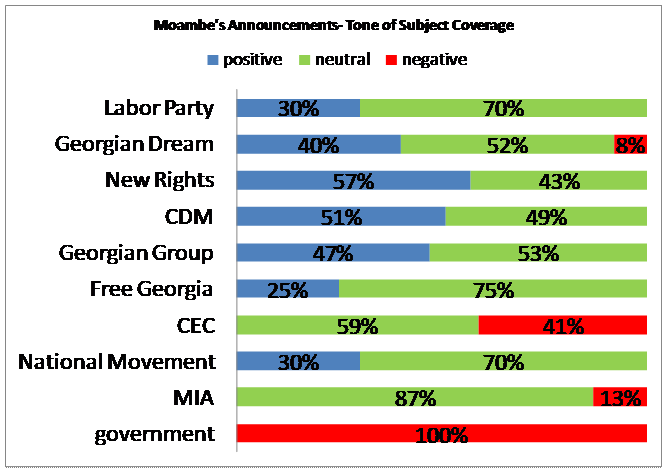
As for the other TV programs, where we observed possible excessive coverage of qualified subjects or other subjects participating in elections, we can assume that Eka Khoperia’s talk show, Auditoria, on August 13 and 20 was particularly interesting to view in the period from August 1 to October 1.
The topic of August 13 Auditoria was love and topic of August 20 program was “Hi, my husband is a politician.” It is noteworthy that both programmes were aired for the second time and that they were not prepared specially for the pre-election period. On August 13, representatives from the National Movement (Vato Natsvlishvili), Coalition Georgian Dream (Gia Tsagareishvili) and Christian Democrat Movement (Irakli Gaprindashvili) spoke about love in Eka Khoperia’s “Auditoria.” On August 20, the wives of many politicians participated in the program. Spouses of Givi Targamadze, Davit Darchiashvili, Giorgi Asanidze, Rati Samkurashvili, Davit Kirkitadze, Papuna Davitaia from the National Movement spoke about their family lives. The wives of Gubaz Sanikidze, Davit Saganelidze and Zviad Dzidziguri from the Coalition Georgian Dream also discussed their lives. The wives of CMD’s leaders – Nika Laliashvili, Giorgi Akhvlediani and Zaza Gabunia, also participated in the program. We can state that number and time dedicated on the wives of representatives of qualified elections subjects in the program was more or less balanced. Relatively less time was spent on the wife of Kakha Dzagania, a leader of Labor Party. Wives from the leaders of former parliamentary fraction, Strong Georgia Gia Tortladze, MP Dimitry Lortkipanidze from free Georgia, representatives of nongovernmental organizations Dachi Tsaguria and Lasha Chkhartishvili also participated in the Auditoria. The program provided the audience more or less balanced information about personal lives of representatives of political parties.
The personal lives of politicians had significant influences on the decisions of voters during Election Day. It is important to note how much time was spent on the life stories of politicians in similar talk shows. We can declare that Eka Khoperia’s Auditoria managed to keep the balance. The audience also received basic information about politicians and their wives from this one concrete entertainment program.
We did not observe any signs of hidden political advertisement in other programs of GPB during the official pre-election period (August 1-October 1). So we can agree with the GPB’s advertisement where Tonino Picula, Jannis Lenarchich, Nikolai Vulchanov, Milan Kabrnov and Audrey Glover are concerned, there was unbiased, impartial and balanced reporting of the GPB.

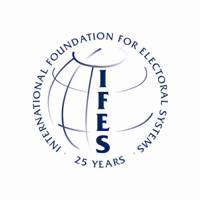
This blog is made possible by the support of the American people through the United States Agency for International Development (USAID). The contents are the sole responsibility of Human Rights Center and do not necessarily reflect the views of the International Foundation for Electoral Systems, USAID or the United States Government.

